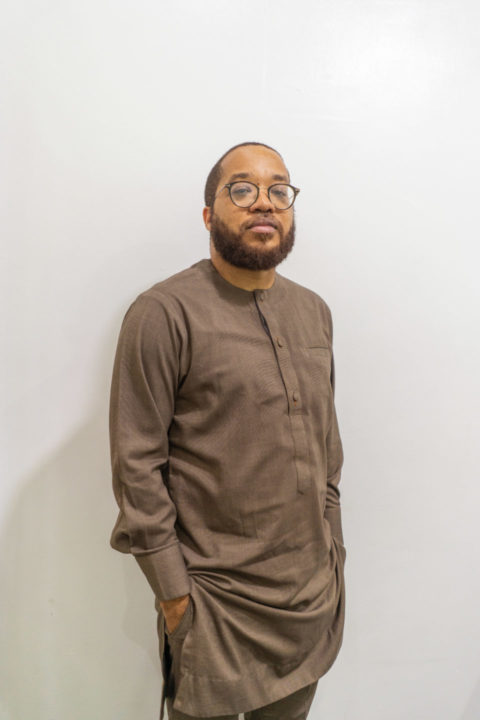“My actual journey into music started as a producer. I just really fell in love with the music. I would come up with melodies and I had a friend of mine that would help me do the drums. I then met my partner, Kayode. I was a producer, he was a rapper, and that was how Aristokrat the label really started”- Peedi Picasso
In 2013, when Nigerian clubs were slamming pulsating Afrobeats bangers that thrived off electric basslines and loose lyrics, the Peedi-Picasso-led Aristokrat records introduced an unknown Burna Boy to a teeming Lagos audience with the laid-back summer anthem, Like to Party.
“We didn’t think it was going to blow. We were like let’s just do something new and fresh, something that will stand out.” Peedi says of Burna Boy’s break-out single when I meet him at the Aristokrat headquarters in the plush neighbourhood of Lekki, Lagos, Nigeria.
Before Peedi was smoothening the soundscape and altering the BPM of Nigerian pop, he was a dreamy-eyed bespectacled teenager, born Piriye Isokari, and raised in the oil-rich South-South city of Port-Harcourt to affluent parents. Despite his weighty financial background, Piriye attended public school in Port-Harcourt and it was the rough edges of life in Port-Harcourt that birthed Aristokrat when Piriye was in his early teenage years.
“Port-Harcourt is violent, and big on gang life. In Port-Harcourt, the violence went down even to secondary schools.” Peedi says matter-of-factly, sporting a smooth brown kaftan “I wanted to create parties where people could just hang out because fights were always breaking out at parties. I had a cousin in Unilag who told me Unilag had clubs, so I created a club and named it, Aristokrat”
Soon after secondary school, Piriye flew out to Oklahoma, America for his university education. There, he shuffled different majors; Electrical Engineering, Information Science, Economics and Sports & Entertainment Law. In Oklahoma, Piriye became Peedi Picasso and he met Kayode, his partner at Aristokrat.
ALSO READ: Demystifying the DMW Music Crew, Here is a List & Breakdown of Members' Roles

Peedi Picasso of Aristokrat Records
“My actual journey into music started as a producer. I just really fell in love with the music. I would come up with melodies and I had a friend of mine that would help me do the drums. I then met my partner, Kayode. I was a producer, he was a rapper, and that was how Aristokrat the label really started”
Although their formative union did not bring mainstream musical success, Peedi and Kayode got nominated for Best Diasporan single at the 2007 NEA Awards. While abroad, Peedi stayed in touch with the local music scene in Nigeria, facebooking Afrobeats forerunners; Audu Maikori and Obi Asika.
“In 2009, I decided to move back, to do five years in Nigeria and go back to do my law school because I left just before my LSATs, I moved to Abuja, and I worked with my dad for a while. In 2010, I moved to Port-Harcourt, and when I felt like I was settled down, like I knew where the next check was coming from, I decided it was time to do music”
ALSO READ: Get To Know the Artistes and Members of Mavin Record Label
On his 25th birthday in Port-Harcourt, a few months after resettling in the riverine city, Peedi got a birthday gift that would change the trajectory of his life. On 31st of October 2010, Jay B from Ijaw Boys Entertainment introduced Peedi Picasso to an aspiring musician named Shorty Gunt - who would later become the Grammy award-winning Burna Boy.
The Making Of Burna Boy

After the initial introduction by Jay B, and further egging on by a mutual family friend, Peedi scheduled a meeting with Shorty Gunt- who also had just relocated to Port-Harcourt from the United Kingdom - at the Ijaw Boys studio.
“He had a British accent. I called him and he was like I've been waiting for you to call. When I met him, he looked like a star, and the music sounded amazing.” Peedi says reminiscently.
Instantly, Peedi offered to sign him but there was a blockade, Shorty’s mother - Bose Ogulu - who doubled as his manager needed to veto the deal. After trying and failing to meet his mother that night, Peedi met the Ogulu matriarch days later but there was a lot of interest in the talented nineteen-year-old. “At that time, Timaya was looking to sign him. Terry G was looking to sign him, and his mom was speaking to a couple labels in Lagos. I think I was telling her that ‘All these people, they’re great and they may have more than me but the thing about me versus them is this guy will be my first artist, if he fails, I fail. His failure is my failure, his success is my success”
Soon after the initial meeting in late October, Aristokrat kicked off operations earnestly. And just before the release of his first single, Freedom, on Notjustok in December 2010, Shorty Gunt changed his name to a name that now reverberates around arenas around the world - Burna Boy. January 2011 marked the release of his critically acclaimed single, Abeg Abeg Abeg, and in February, the RnB flatlined single, Sweetest Girl was released. By April, Burna Boy’s first tape, a meld of reggae and Afro-bashment, Burn Notice, was out in stores
“Artists would come down from Lagos and look to collaborate with Burna. I remember Davido came for a show in PortHarcourt at Play Nightclub. That night, the club was hosting Davido and Burna Boy. Our studio was down the street, and that day, they recorded a song called Trumpet. That led to Davido inviting us to Lagos for his Damiduro video shoot”
Enticed by Lagos' spirited lifestyle, Burna Boy was keen to move to Lagos but Aristokrat was not ready. Peedi besought his Lagos-bred partner, Kayode to move back to Lagos from the United States to ease the transition process. In February, Kayode moved back to Lagos and for what would be their final gambit in PortHarcourt before relocating to Lagos, Aristokrat hosted a concert tagged 'Burna Live' in April 2012. The concert was mildly successful “There was a robbery at the road before the concert, people that were really dedicated braved it. This was a thing in PortHarcourt, they would block the road and rob cars when they know there’s a major event in the area.”
In May 2012, Aristokrat and their lead artist, Burna Boy, moved to Lagos and kickstarted a musical journey that would expand across multiple countries, impressive festival lineups, countless awards, and a Grammy win.
ALSO READ: These Are the Members and Artistes of Chocolate City Music
Burna Boy did however return to Port-Harcourt in December of that year but only to rake all the awards at Port-Harcourt’s most prestigious award show, Odudu Awards.
The Aristokrat Dynasty
In May 2012 when Aristokrat tried to wiggle their way into the heart of the Lagos music scene; Mavin Records had just launched, Timaya’s Bum Bum was all over radio airwaves, and the clubs were littered with peak euphoria of Afrobeats new offshoot - the Pon pon sound.
“We had a song, Touch Your Toes, that appealed to the market. Bigtime at Rhythm FM was already playing Touch Your Toes.” Peedi rallied me through Aristokrat’s moment of reckoning. “We were like let’s just do something new and fresh, something that will stand out, so we put out Like To Party. The song was recorded in December 2011. We said we'll get back to Touch Your Toes after Like to Party but we never did.”
Following the success of Like to Party, Burna Boy followed up with a slew of widely accepted singles that skyrocketed his career, and platformed him as one of the most exciting next-gen Afrobeats artists at the time. Burna’s astronomical rise transitively put Aristokrat on the map, and beamed the first attempt of the Aristokrat dynasty with artists such as Ozone, Mojeed, Pucado and Karma being added to the roster.
“We discovered Ozone during the time of Burn Identity in Port Harcourt. He was friends with Leriq. Mojeed was from a New York-based website that used to do barbershop battles. I met Pucado the same day I met Leriq. He was simply a hustler that had such an infectious personality. He was Burna’s hype man in Port Harcourt off his personality at some point. Karma, we discovered from Project Fame.”
Although Karma and Pucado never cracked widespread recognition, Ozone and Mojeed received critical acclaim for their respective projects; Superiority Complex and Westernized West African. Afterward, their careers seemingly petered away
“The music was never a problem, the business was the problem. The industry was the problem. For the younger artists, when they came out, Aristokrat was more visible. People were not as patient with them” Peedi explained, his rimmed glasses resting evenly on his nose.
In 2013, off a venture capitalist investment of an initial half a million dollars, Aristokrat merged with 2Baba-led Hypertek Digital to form a unilateral music label - 960 Music Group. Peedi was brought in to head operations at 960 Music Group. That merger birthed Leriq’s hallmark single, Comment Tu T’appelle, which featured Burna Boy, Dammy Krane, Mojeed and Ozone.
In 2014, while Burna Boy’s Aristokrat contract wound up, local media reported that the relationship had gone sour. “No bad blood, there were moments when there was tension but it was just the internet”. Just before Peedi spoke further, he was interrupted by a co-worker who reminded him of an impending meeting, he dismissed it and opted to continue with the interview “Burna was done by a team of four people. Eni, the lady that just came in, myself, Kayode, Hutch.” Peedi acknowledged proudly. After Burna exited Aristokrat, the label focused its resources on their other talents and weaned off Burna’s extensive revenue-generating potential, Aristokrat diversified into a services company, and ultimately evolved into a creative agency.
However far away Aristokrat strayed into other business ventures, music was at the heart of Aristokrat. In 2016, Aristokrat collaborated with Burna Boy on a joint venture agreement to create the enamouring Redemption EP, which saw long-time allies Leriq and Burna Boy reunite after some time apart, and spawned off the career-stimulating single, Pree Me. The success of the Redemption EP spurred Aristokrat to collaborate with Afrobeats forebear, Wande Coal, for smash singles, Iskaba and Ballers, and an eventual joint venture agreement was agreed upon but the Leriq-owned single, Wishlist, was the only fruit of that association.
“For us to get back into the music business, what we needed was a partnership. Although we were making money, my partners were not too happy that we were not visible in the label space.”
Aristokrat’s label resurgence would come in the form of the signing of pop artist Ceeza Milli, famed for his work on Starboy’s worldwide smash hit, Soco. Cameroonian singer, T’neeya, was added to the roster shortly after. After witnessing firsthand the process of Burna Boy signing to Atlantic via a JV agreement with Bad Habits, Peedi Picasso's next mission for Aristokrat was set; find a partner that could scale the company’s local footprint into global dominance.
Burna Boy’s record deal with Atlantic shaped the success of his culture-defining 2019 album, African Giant, and his Grammy-winning 2020 follow-up, Twice As Tall.
View this post on Instagram
Burna & Ceeza Milli scandal
In April 2020, three months after Burna’s Boy Coachella-fuelled album, African Giant, was passed over by the Grammys in the Best World Album Category, Ceeza Milli claimed to have written the eclectic smash hit, On The Low. Burna Boy refuted the claims and even went as far as threatening Ceeza Milli on social media before retracting his statements with an unreserved apology.
ALSO READ: Ceeza Milli Releases Statement, Confirms He Wrote Burna Boy's 'On The Low'
“Then, when we were working on African Giant, it was just supposed to be singles for this market. We were coming off the back of Ye, so the pressure was a lot. I was putting production camps together, the first one was with GMK and Odunsi but the records they were making were more alte-ish.” On The Low is arguably Burna Boy’s most successful song. The song has drawn over half a billion streams across streaming platforms and is certified Gold in France
View this post on Instagram
“Some producers are just beatmakers, and some producers contribute during sessions. Ceeza engineers. He would bring producers and he would be on the board, he was the one recording Burna. During the time he was there, he Ceeza brought Kel P in.” Ceeza was motivated to engineer sessions in return for songs with Burna Boy for his album “At the first session, we already had the songs for Ceeza that Burna took and put Davido on it. It was meant to be Burna, Ceeza and Davido on the song” Plans for the release of the songs were shelved after the public spat between Ceeza Milli and Burna Boy “Burna was still trying to get Ceeza to engineer a session, I linked them, Burna then moved from Ceeza to Kel P because Kel P was a producer that contributed during sessions. I asked Kel P if Ceeza wrote on the song, he said Ceeza didn’t write on it. I was not there, and Burna said no as well.”

Peedi Picasso and Universal Music France
A month after the Ceeza-Burna songwriting scandal, Aristokrat’s desired partnership came in the form of an agreement with Universal Music France. “I am very proud that Aristokrat Group has chosen Universal Music France as its strategic partner to reach a global audience ”Olivier Nusse, CEO, Universal Music France, said, in a statement about the agreement
Aristokrat Group boasts a bevy of talents signed under different agreements.
Producers Kel P, TMXO, Sazzy, Steve Jazz, and mixing & mastering engineer, Focus Ramone have signed publishing deals. Singer, Seyi Shay, is signed to a management and publishing deal. Jujuboy Star, initially signed to a management deal, and Lemonade star, Ria Sean, are both signed to record deals.
“We are working on a compilation project called Sound Of The New Africa. Kel P has two projects, like a producer and artist collaboration; the first will be with Wande Coal and the second with Yxng Bane.” Peedi starts about further 2021 plans before adding “We are looking to drop a Jujuboy project this year as well as something for Ria Sean.”

With his far-reaching business acumen established with Aristokrat records and risk-taking tendencies, I wondered what Peedi Picasso would desire his legacy to be.
“I built a structure that worked. I built a sustainable structure. We need institutions, artists are just ambassadors of the culture.” Peedi cited how labels such as DeathRow, Def Jam offered longevity to hip-hop culture and how his major goal is building an adaptable blueprint for Afrobeats success “Artists are not the ones responsible for whether the culture is sustained. Institutions are. I want to be one of those or build one of those.”
“Where do you think Afrobeats will be in five years?” I stride further with my closing questions.
“In five years, Nigerian culture will be as consumable as American pop culture. This is just the beginning of the wave.” Peedi says evenly with a glimmer of hope “In 2017, I remember a conversation I was privy to with the execs at Atlantic. They said what they were doing was a cultural signing. They had noticed a cultural trend that would take about six years to settle in. And Burna, Davido, and Wizkid will be the poster boys of that.”
Peedi is an unassuming maverick with visions of intercontinental domination. With Burna Boy’s ascent, Peedi Picasso has seen firsthand global success, now he is aiming for collective domination as Aristokrat raises a new generation of upstarting talents.
“What’s the first word that comes to your mind when you hear Aristokrat?” I ask Peedi my final question
“Global”.
For more issues of Afrobeats the Business, keep up with Notjustok via Twitter and Facebook for updates in real time.
The post Afrobeats The Business Vol 1: Peedi Picasso of Aristokrat Records Is Focused On Global Success appeared first on NotjustOk.
from NotjustOk https://ift.tt/3iugcYF
via IFTTT